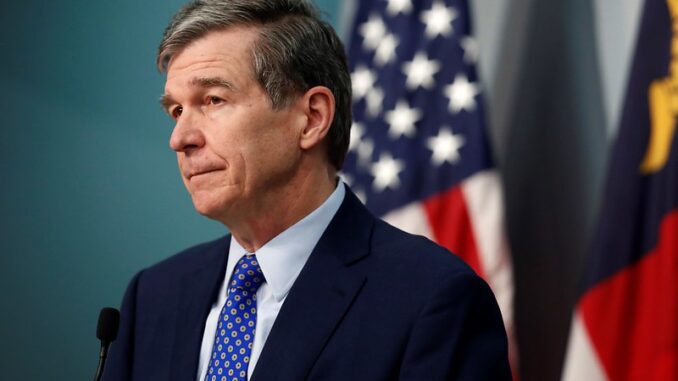
RALEIGH – Gov. Roy Cooper on Friday vetoed SB 37, a bill that would have required an in-person instruction option for school districts across the state.
Cooper previewed the veto in news conferences, saying that the bill did not meet requirements for him to approve of the measure. He said the bill for middle and high school students to go into classrooms is in violation of N.C. Dept. of Health and Human Services (NCDHHS) and Centers for Disease Control and Prevention (CDC) guidelines and hindered local and state officials from protecting students and teachers during an emergency.
“Students learn best in the classroom and I have strongly urged all schools to open safely to in-person instruction and the vast majority of local school systems have done just that. As I have informed the legislature, I would sign the bill if these two problems are fixed,” Cooper said in a statement about the veto.
“As written, the bill threatens public health just as North Carolina strives to emerge from the pandemic. Therefore, I veto the bill.”
N.C. Senate Republicans released a statement minutes before the governor’s office from Sen. Deanna Ballard.
Sen. Ballard said, “At the same time the Governor boasts of teacher vaccinations after giving them a higher priority than cancer patients, he vetoes this school reopening bill because it offers school districts the flexibility to operate under the plan that best suits their on-the-ground needs. With teacher vaccinations in full swing, there is no legitimate excuse for Gov. Cooper and the far-left NCAE to oppose the broad reopening flexibility this bill grants to school districts.”
“The far-left NCAE owns the Governor’s mansion. Thankfully, Senate Bill 37 passed with enough bipartisan support to override Gov. Cooper’s veto, and we expect to bring it up for an override vote,” Ballard added.
The N.C. Association of Educators supported the veto, saying, “The best action all legislators can take right now is to encourage their communities to comply with the safety protocols and to encourage the vaccination of all school employees. We thank Gov. Cooper for vetoing this bill, and we look forward to working with him and the Legislature in crafting a safe return to in-person instruction.”
Cooper and legislators and differed over the health guidelines the bill would include. Legislators contend that the StrongSchoolsNC Public Health Toolkit is followed and is referenced prominently in the bill. When pressed at the Feb. 24 virtual press briefing, Cooper reiterated his earlier claims. His main sticking point seems to be allowing middle and high schools to return under Plan A even though social distancing would still be employed.
Both Senate leader Phil Berger (R-Eden) and House Speaker Tim Moore (R-Kings Mountain) also stated an override would be sought.
The school reopening bill that @NC_Governor just vetoed passed the legislature with bipartisan supermajorities. Education policy should be driven by the best interests of children, not the far-left@NCAE,” tweeted Berger. “We will bring an override vote to the floor.”
“With this veto the Governor ignored desperate parents, policy experts, and students who are suffering from his refusal to let them return to the classroom,” Moore said. “The legislature has worked hard to find common ground with the Governor, but we have a constitutional duty to provide education access to our students and will pursue a veto override on behalf of North Carolina families.”
N.C. Republican Party communications director Tim Wigginton said of the bill, “Gov. Cooper vetoed SB 37 to keep as many kids as possible locked in failing virtual schools at the same time he’s actively settling with left-wing activists to let thousands of convicted criminals out of prison.”
State Superintendent Catherine Truitt also weighed in, posting a brief statement on Twitter that said students belong back in school for face-to-face instruction.
“This bill provided local discretion to school districts while aligning with the NC Department of Health and Human Services’ StrongSchoolsNC Toolkit to mitigate risk and prioritize health,” said Truitt.
Truitt said the bill should have been “a win for students, parents and districts across the state,” and that she is “disappointed to see politics at play when we know where the science stands.”



